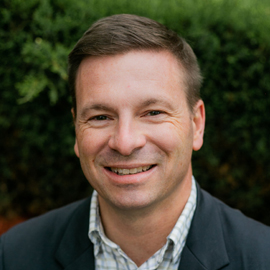
John Pepperdine
John talks about two important lessons he learned in times of crisis and gives a bit of inspiration and inoculation against pessimism and panic of uncertain times.
Lesson #1
It was January of 2009, four months after the biggest stock market drop in history. I was meeting a donor in New York City who had just contributed a six-figure gift in August to establish an endowment. While the visit was to assure him the endowment he funded was being managed — or as much as you can manage a runaway truck that lost it brakes — I wasn’t overly concerned about his reaction to the drop in value. I’d discussed how the endowment was going to be exposed to market forces before he had made the gift, and I knew this donor was a very sophisticated investor who was aware of market risks.
Still, telling a donor the endowment they just funded lost a third of its value within 60 days receiving his funds did not fill me with joyful anticipation. Additionally, I was going to up the stakes even more by asking if he’d be interested in supplementing the endowment to make up for the shortfall caused by the loss of principal.
But I also knew he wanted the endowment to cover the cost of tuition, and he’d know that a drop in its principal would necessitate a cash infusion most likely. So, knowing the donor, I believed he would appreciate I was asking for the sake of the students the endowment supported.
Meeting over breakfast, we had a friendly chat about the ebb and flow of the market.
We discussed the risks and rewards of “playing in the market.” At the time, he seemed quite nonchalant about it while everyone else I knew was trying to convert the remainder of their stock to gold, silver, or just transition to the barter economy and be done with it.
As we were about to finish, I broached the topic of making a supplemental gift to the endowment fund, which had been walloped by the stock market collapse. Admittedly, I was a bit nervous because of my previous conversations with dozens of other donors sharing with me their stories of losing a third of their retirement.
After the words left my mouth, and I gave him time to consider what I was asking, he slowly and hesitantly shared with me something that he was a bit embarrassed to admit. He said, quite sheepishly, “John, I don’t feel great about admitting this, but I did very well with the market drop.”
It turned out he bet against the market and made a substantial sum. Naturally, he felt a bit guilty and wasn’t wanting to share with many he’d cashed in as everyone was losing their shirt. After that, the conversation was much more he might give if the endowment didn’t recover the next year. That was Lesson #1: Even in the biggest recession in recent years, there were donors capable and wanting to give, so don’t be afraid to have conversations and ask (see: Fundraising Truth: I’ve never talked anyone into a gift).
Lesson #2
A couple of months after the World Trade Center attacks of September 11th back in 2001, I began reaching out to donors I knew in New York City to see if they’d be interested be meeting. One donor, in particular, was interested in funding a fellowship to honor his father. While he wanted to visit to discuss the details, he warned me that his position at the Wall Street Journal was tenuous because of the attack. Still, he was adamant we have the discussion
I met him and his wife in New York City to discuss the proposal, and they thanked me for giving them the opportunity to consider making a large gift. We spoke after I returned home, and he let me know the timing to make the gift was just not right. While I stayed in contact, I was careful not to mention the proposal unless he mentioned it. Several months later, he called to say he did decide the timing was right and was ready to make the gift. What had changed? Instead of being laid off from the newspaper, he received a sizable promotion. Lesson #2: Even in times of crisis, stay in contact, plant the seeds for people to consider gifts, and give them time to decide.
If I can provide anything to clients, it’s to share what I’ve learned from these experiences so they and their causes can benefit you (and save you a couple of trips to New York City). For that matter, if I can provide anything to the public about fundraising, it’s the same. Sure, times change, but human nature has remained steady.
In that spirit, the recent stock market drop, and coronavirus concern, remind me of the market drop of 2008 or the post 9/11 days – though I will say I don’t recall people scrambling to hoard toilet paper like they are now.
But institutions and nonprofits did begin to rethink their relationships with donors. They began to ask themselves: should we talk to donors, should we ask?
Conclusion: Your Lighthouse in the Storm
Yes, you should talk to donors (see: 10 Steps to Better Donor Engagement), and you should ask them to consider giving. To put it bluntly, don’t fear conversations and don’t fear making an ask of donors as long as you’re respecting the relationship. Just as you wouldn’t ask a donor to consider a gift in the best of times, if you sensed it wasn’t right, you wouldn’t in the more difficult times. By the same measure, many donors want to help during difficult times just as they’d like to help in better times. Often, these are the donors who want to step up to the plate and help those in need, especially during the worst of times.
Furthermore, during a crisis like the current coronavirus, many donors want to know what your institution, school, or nonprofit is doing. How are you addressing this, and can they help financially in a way that will maximize their gifts impact to the area or people they care most about.
Finally, here’s a bit of inspiration and inoculation against pessimism and panic. Over the last 40 years (see chart below), you’ll see charitable giving is affected by recessions but never, repeat NEVER, drops off the cliff. Yes, pay attention to donors, listen to them, and respect (see: Your Donors Feel’n like Transactions: Signs and Solutions) what they’re telling you. But don’t make false assumptions, and don’t assume you know their situation. You owe it to the cause you’re raising funds for, the institution and nonprofit you believe in, and most of all, you owe it to the donor.



